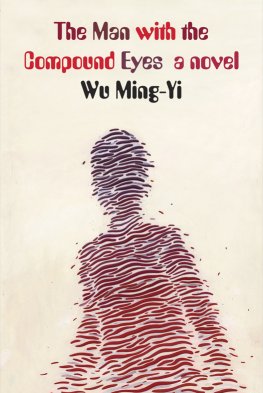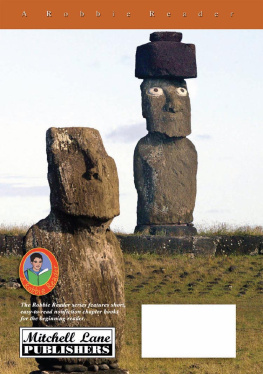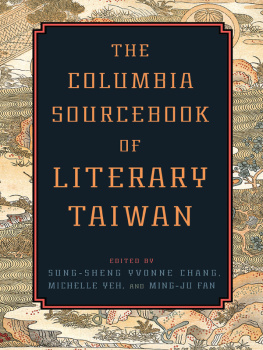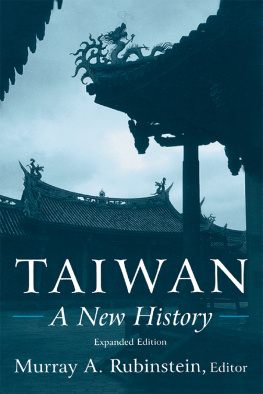Wu Ming-Yi
The Man with the Compound Eyes
Wing above wing,
flame above flame.
W. B. Yeats
The trickling of water through the fissures in the subterranean rock was suddenly drowned out when the mountain made an immense but also somehow distant sound.
Everyone fell silent.
Then Jung-hsiang Li shouted. That sure wasnt groundwater surging. Wasnt loose rocks shifting or bedrock bursting, either. And it obviously wasnt a vocal echo. It sounded more like when something bumps into a flawless glass vessel from somewhere within the glass you hear a spiders web begin to spread before the cracks appear. The sound vanished straightaway, and the only thing the people in the cave and the control room could hear was the huff of each others breathing and the hiss of the radios.
Detlef Boldt heaved a huge sigh of relief and asked, Did did you all hear that sound just now? speaking in English with a heavy German accent. Nobody replied, not because they hadnt heard it, but because they didnt know how to describe it. Then the electrical system cut out, and deep in the mountain the cave went black. It was too dark to see a thing. There it was again. It was as if some colossal being was marching through the mountain, either toward them or away.
Shhhh! Stay quiet! Jung-hsiang Li deliberately kept his voice down, lest the sound waves induce vibrations in the rock walls and cause another collapse. But actually everyone had quieted down already.
The people of Wayo Wayo thought the whole world was but a single island.
The island was situated in the midst of an immense ocean, far from any continent. As far as island memory reached, the white man had once visited the island, but nobody had ever left and brought back news of another land. In the beginning, people believed, there was nothing but a shoreless sea, until Kabang (the word for God in the Wayo Wayoan language) created the island for them to live on, as if placing a small, hollow clamshell in a tub of water. The island followed the tides, floating around in the ocean, which was a source of sustenance for the people. But some of the oceans spawn were the avatars of Kabang. The asamu, for instance, was a black-and-white fish sent to spy on people, and to test them. For this reason, it was counted among the creatures that could not be eaten.
If you are so careless as to eat an asamu, you will grow a ring of scales around your navel, a ring of scales that you could never finish peeling off your whole life long. Leaning on a whalerib staff, the Sea Sage hobbled over and sat under a tree every day at dusk to tell the little ones all the stories of the sea. He talked until the sun dipped below the waves. He talked until the boys became youths, and until the youths endured the rite of passage and became men. His speech carried the smell of the sea, and there was salt on his every breath.
So what if we grow scales? one boy asked. The children here all had enormous eyes, like the eyes of a nocturnal animal.
Oh my child, people cant grow scales, just like a sea turtle cant sleep with its belly to the sky.
Another day, the Earth Sage took the children to the field in the hollow, to the place where the akaba grew. One of the only starchy plants on the island, the luxuriant akaba, a word that meant shaped like the palm of a hand, seemed to raise innumerable hands in supplication to the sky. The island was small and the people lacked farming tools, so pebbles were piled around the plots, to keep the soil moist and to serve as a windbreak. You must love the land, my children, and ring it in with your love. For the land is the most precious thing on this island. It is like rain, like the heart of a woman. The Earth Sage showed the children how to arrange the rocks. His skin was dry like cracked mud, and his back was arched like an earthen mound. In all the world, the only things worth trusting in are the land, the sea and Kabang, my children.
At the southeast corner of the island was a coral lagoon, a good place to catch fish with thrownets or to collect clams. To the northeast, at a distance of ten husks (ten throws of a coconut husk) there was a cay, a coral reef that was fully exposed at ebb tide. This was where the seabirds flocked. The Wayo Wayoans hunted the birds with gawana. To make a gawana, they tied branches into a tool that had the virtues of club and spear, with one end blunt and the other end sharpened to a point; then they passed a rope of saltgrass through a hole in the blunt end and tied one end into a noose. Armed with a gawana, a fisherman would row his talawaka near the cay and let the ocean current carry him along, pretending to ignore the birds as he prayed to Kabang. When he drifted within range he would hurl his gawana. Blessed by Kabang, the noose would slip, just so, over a seabirds neck, and a deft flick of the wrist would impale the bird on the pointy end. Blood would trickle down from the point, as if the gawana itself had suffered a mortal wound. The only resistance the albatross, the booby, the pelican, the petrel and the seagull could put up was proliferation. When the birds stopped in spring to build nests, people would feast on eggs, wearing cruel and satisfied smiles on their faces.
As on any island, there was never enough fresh water on Wayo Wayo. The only sources were rain and a lake at the center of the island. Consisting mainly of fish and fowl, the diet was salty, giving the people a thin and dark appearance and often leaving them constipated. At dawn they would squat over pit latrines, facing away from the sea, often getting teary-eyed from the strain.
The island was so small that most people could set out after breakfast, walk all the way around and return not long after lunch. For the same reason, people were accustomed to a rough parlance of facing the sea or facing away to orient themselves, and the only way to face away was to face the hillock at the center of the island. People talked facing the sea and ate facing away. They conducted rituals facing the sea, and made love facing away, so as not to offend Kabang. There were no chiefs among the people, only elders, the wisest of whom were called old men of the sea. The front door of the home of a family in which an old man of the sea had lived faced the shore. Adorned with shells and carvings, Wayo Wayoan houses looked like capsized canoes. They stuck fish skin to the walls, and the whole community would gather round and build a coral fence out in front to block the wind. The islanders could neither walk to a place where the sea could not be heard nor have a conversation in which the sea was not mentioned. In the morning, they greeted each other, Are you going to sea? At noon they asked, Shall we test our luck at sea? And at night, even if the weather had been too rough to go fishing today, they exhorted one another, You must remember me a story of the sea. As a rule, the Wayo Wayo went fishing every day. Fishermen who met on shore would yell, Dont let the monae steal your name! Monae meant wave. When people bumped into one another, one would ask, So hows the weather at sea? Even if a gale was blowing, the other had to reply, Very fair. The tonality of the Wayo Wayoan language was sharp and sonorous, like birdsong, with each utterance ending in a light trill and a plop, like a hungry seabird that swiftly dives and breaks the waves in search of prey.
Occasionally, the people went hungry, the weather was too rough, or two of the villages would come into conflict; but no matter how he spent his days, everyone was skilled at telling diverse stories of the sea. People told tales at meals, when they met, at rituals, and when making love. They even told them in their sleep. A complete record had never been made, but many years later anthropologists might know that the islanders had the greatest number of sea sagas of any people on Earth. Let me tell you a story of the sea was on the tip of everyones tongue. They did not ask how old people were, but simply grew tall like trees and stuck out their organs of increase like flowers. Like the obstinate clam they just passed the time. Like a sea turtle each islander died with the curl of a smile at the corner of his mouth. They were all old souls, older than they appeared, and because they spent their lives staring at the sea they all had melancholy miens and tended to get cataracts and go blind in old age. When they were ready to go, old folks would ask the youngsters by the bed, Whats the weather out at sea like now? People believed that dying while gazing at the sea was the grace of Kabang. Their lifelong dream was to arrive at the moment of death with an image of the ocean in the ocean of the mind.








